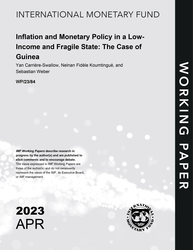
Inflation and Monetary Policy in a Low-Income and Fragile State: The Case of Guinea
Inflation and Monetary Policy in a Low-Income and Fragile State: The Case of Guinea
READ MORE...
Volume/Issue:
Volume 2023
Issue 084
Publication date: April 2023
ISBN: 9798400241277
$20.00
Add to Cart by clicking price of the language and format you'd like to purchase
Available Languages and Formats
| English |
Prices in red indicate formats that are not yet available but are forthcoming.
Topics covered in this book
This title contains information about the following subjects.
Click on a subject if you would like to see other titles with the same subjects.
Inflation , Economics- Macroeconomics , Money and Monetary Policy , Economics / General , Monetary Policy , Inflation , Low-income Countries , Fragile States , inflation dynamics , shocks to inflation , monetary policy shock , commodity price movement , inflation development , Monetary base , Exchange rates , Exchange rate arrangements , Nominal effective exchange rate , Global , Sub-Saharan Africa
Also of interest
Summary
Inflation in low-income countries is often high and volatile, driven by external shocks. In addition, inflation in fragile states is affected by highly volatile domestic factors that complicate monetary policy’s ability to deliver price stability. We estimate the drivers of inflation in Guinea since the early 2000s, a period in which the country suffered major shocks from pandemics, commodity price movements, and multiple military coups, and during which inflation averaged 12 percent. Results confirm that global commodity and transport prices account for a large share of the variation in inflation. The contribution of monetary policy shocks to inflation is moderate, reflecting its broadly neutral stance throughout most of the last two decades. However, monetary policy has occasionally made larger contributions to inflation, and recently helped contain price pressures from high commodity prices. The effectiveness of monetary policy reflects a strong relationship between monetary aggregates and the exchange rate.
Copyright © 2010 - 2026
Powered by:
AIDC



